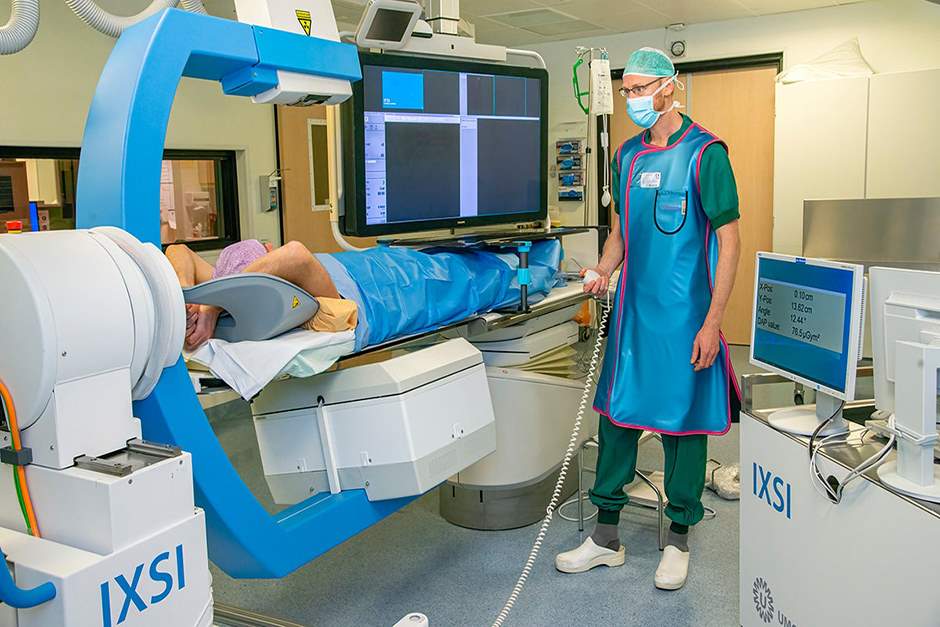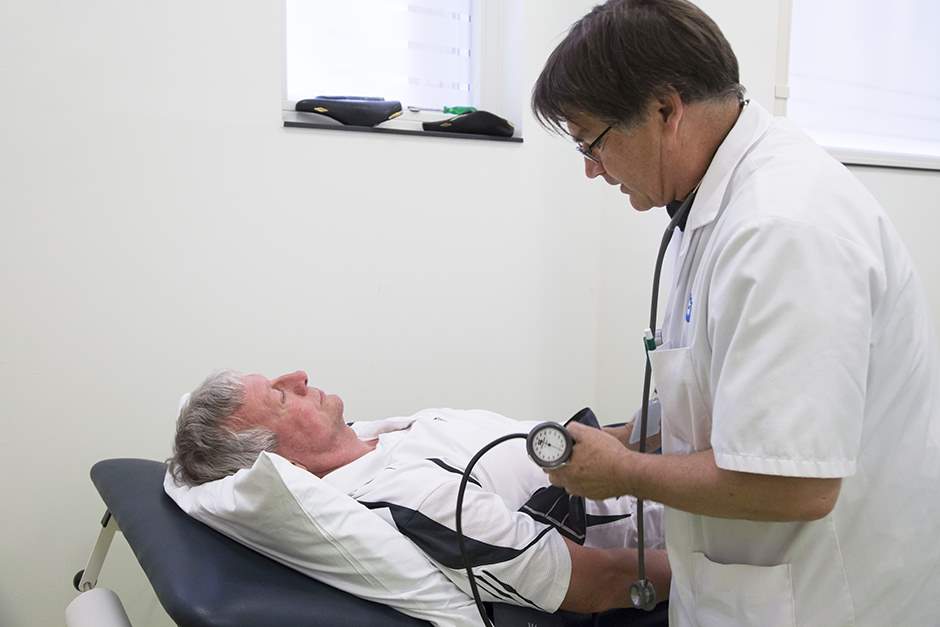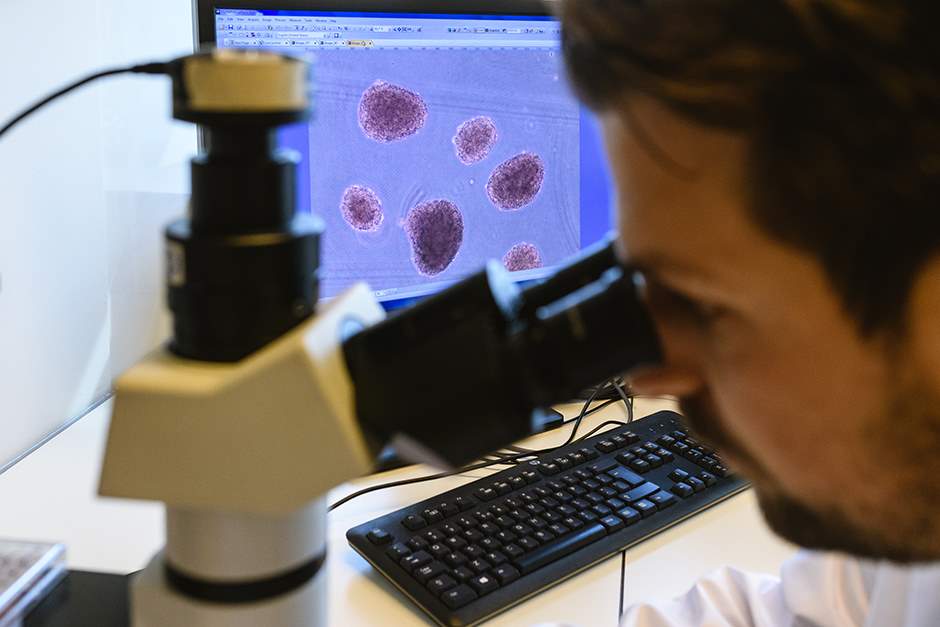Research funding
In 2023, our fund-raising capacity for research was € 133 million (100 million in 2022). This means that we exceeded our target of € 112 million. In 2023 we received the following research subsidies among others:
Investments from the National Growth Fund
The Dutch National Growth Fund
(NGF) invests in projects that make the biggest possible contribution to sustainable and structural economic growth.
In 2023 the NGF gave an award to the DUTCH-project
in which UMC Utrecht is involved. With the rising demand for healthcare and an increasing scarcity of staff in healthcare, a shortage in operating capacity of 20% is expected in 2030. In the DUTCH-project, UMC Utrecht is working in a group that includes other university medical centers, universities, and companies as well as the Ministry of Public Health, Well-Being and Sport, to reduce the drain of current healthcare professionals, increase inflow (and operating capacity), transform healthcare education in the Netherlands, and provide sufficient continuous and refresher training.
In addition, the NGF has earmarked € 125 million for a new Center for Non-Animal Biomedical Translation (CPBT) to accelerate the transition towards research without laboratory animals in the next 10 years. Instead of laboratory animals, we are using increasingly advanced patient models which also brings us closer to the conditions of actual patients and drugs with a better chance of success. This will yield economic and social gains: better drugs, and less animal testing. CPBT, in which UMC Utrecht plays a big role, aims to focus on transition programs for instance in the fields of ALS and cystic fibrosis. This will ensure that drugs for these diseases become available faster for patients.
UMC Utrecht is now a partner in the following approved and selected projects in the category Health and Healthcare in the three NGF rounds . Besides DUTCH and CPBT from this round, this includes Health-RI and RegMedXB from the first round, and Oncode Accelerator (previously Oncode-PACT), Biotech Booster , and PharmaNL from the second round. UMC Utrecht is also a consortium partner in NXTGEN HIGHTECH . Oncode Accelerator was officially launched in September 2023 . Within Oncode Accelerator, UMC Utrecht works together with more than 30 public and private partners to get new cancer medication to patients faster .
Better recovery after a stroke
Each year about 40,000 people in the Netherlands suffer from a stroke. Many of them retain scars. They may for instance find it more difficult to move a hand or an arm, which limits them in their everyday life. No treatment to date has proven effective if these complaints are still present days or weeks after a stroke. In 2023, researchers from UMC Utrecht received a grant of € 4 million from the Veelbelovende Zorg (‘promising care’) program of the Dutch healthcare institute, Zorginstituut Nederland. With this money they can now do research on motor recover after a stroke by means of brain stimulation . If the result is positive, the treatment will be included in the basic package of health insurance.
Treatment for liver cancer reduced from 2 weeks to 2 hours
Treatment that takes two hours instead of two weeks: in 2023, the green light was given for two clinical studies where liver-cancer patients will be treated with a hybrid C-arch . The device, invented at UMC Utrecht, makes radio embolization faster and more flexible. The project forms part of the IMAGIO consortium, which has now received an Innovative Health Initiative (IHI) grant of no less than € 24 million from the European Union.

Reduced risk of asthma RSV infection
UMC Utrecht will be leading an international consortium that seeks to understand why children who had an RSV infection as a baby seem to have a greater chance later of developing asthma . The study which will take five years is funded by a HORIZON HLTH 2023 grant of € 7 million from the European Commission. Pediatricians, infection specialists, lung specialists, and other health professionals will work together in this study. The results could contribute to better treatment for chronic respiratory diseases. It could also make people more aware of RSV and the link with chronic respiratory diseases such as asthma and COPD.
New MRI techniques and insight in food allergies
A consortium of seven partners, led by the Donders Institute for Brain, Cognition and Behaviour of Radboud University, in which UMC Utrecht is also closely involved, received a NWO Roadmap grant of € 19 million in 2023. Thanks to this, the first MRI scanner in the world with a magnetic strength of 14 Tesla , which is suitable for tests on humans, will be built in Nijmegen.
A group of Dutch research institutions, companies and social partners led by UMC Utrecht also received a Perspectief (Prospect) grant of € 4.5 million from the Dutch Organization for Scientific Research (NWO). With this money the so-called ‘CHIME-consortium’ will developnew, advanced MRI technologies . The aim is to get a clearer picture of brain processes that play a role in dementia, so that the development and testing of possible treatments could be more effective.
In the scope of the NWO research program ‘Safe and healthy nutrition and food systems’ the project ‘Monitoring the Safe Introduction of Novel foods’ (MoSIN) was also rewarded in 2023. In this project, a consortium led by UMC Utrecht with partners from the food system is investigating how a food allergy develops in an altered nutritional environment . For example from animal to plant foods. The knowledge gained in this study will be used to develop and implement a monitoring system for rising food allergies.
Better personalized treatment for high blood pressure
Het consortium bestaat uit twaalf partners en het onderzoek wordt geleid door het UMC Utrecht. An international research team has received a subsidy of € 10 million from Horizon Europe and UK Research and Innovation . With this subsidy, the HYPERMARKER team will develop and test instruments with which clinicians, by means of artificial intelligence, could select the most effective personalized treatment for patients with high blood pressure. The consortium consists of twelve partners and the study is led by UMC Utrecht.

Pandemic preparedness and active cooperation
How could we detect a possible pandemic at an early stage so that we can work together more effectively? The funding organization ZonMw in 2023 released € 2.5 million to the Netherlands Centre for One Health (NCOH) for research on pandemic preparedness based on lessons learned from the COVID-19 pandemic. Nine Dutch knowledge institutions, including UMC Utrecht, are taking part in NCOH.
Vaccine against inflamatory rheumatism
ReumaNederland in 2023 made € 500,000 available to Utrecht University, UMC Utrecht, and Radboudumc for a follow-up study on a vaccine against inflammatory rheumatism . This vaccine should ‘reeducate’ the immune system to prevent joint tissues from getting damaged as happens in patients with inflammatory rheumatism.
More effective use of immunotherapy
How can immunotherapy be used more effectively against head and neck cancer, liver cancer, multiple myeloma, and other types of tumors? And how do we avoid over-treating children with thyroid cancer? These questions are being investigated in four new studies at UMC Utrecht . KWF Kankerbestrijding (for cancer prevention) announced in 2023 that they would finance these projects with a total of € 3 million.
Researchers from UMC Utrecht are also starting with three innovative cancer studies with organoids , made possible by a total of nearly € 1.6 million in subsidies from KWF Kankerbestrijding. Organoids (a Utrecht invention) are a kind of ‘mini organs’ that could contribute significantly to the customization of cancer treatment, among others.
Sector plan: reinforcing basic scientific research
In the period 2023-2029 UMCs in the Netherlands together received approximately € 40 million per year for the implementation of the sector plan for medical and health sciences . The aim is to offer researchers and lecturers peace of mind and scope through extra jobs and more fixed appointments. This reinforces the basis of scientific research and education in order to take on major challenges in health and healthcare.
In 2023, UMC Utrecht developed a plan to use the awarded resources (about € 5 million per year) for various projects within the scope of the topics that were jointly defined by UMCs in the Netherlands: prevention and data-driven innovation, from basis to application as well as the accompanying educational innovation. The results for 2023 were presented in a joint annual report for all UMCs drawn up by NFU.
Within the topic of prevention, we are for instances focusing on reducing socioeconomic health discrepancies via a district-centered approach, including with the cooperation of Health Hub Utrecht . And for the topic of data-driven innovation we are working among other things on setting up the data facility U-Cloud .
Support for researchers from national support programs (NPO)
During the Coronavirus pandemic there was less capacity/opportunity for scientific research that was not related to COVID-19. Due to this a lot of scientific research has been delayed since March 2020 . In 2021 and 2022 UMC Utrecht received € 8.5 million in total from the National Program for Education (NPO), the national support program for education and recover and prospects for researchers.
From 2012 up until 2023, UMC Utrecht spent a total of € 6.461 million to cover (a part of) the salary costs of 458 PhD students and post-docs (approximately 40% of UMC Utrecht researchers). This included € 700,000 in 2021, € 2.906 million in 2022, and € 2.855 million in 2023. The rest of the money we received has been reserved for outflow in 2024.
The decision on how to use the NPO funding was made in consultation with representatives of the divisions, the strategic focal points, and the R&D Council of UMC Utrecht. The compensation on average was equal to three months of wages. In addition, UMC Utrecht used € 1 million from its own resources to compensate for the wage costs of another eighty or so researchers.
Starter and incentive grants for researchers
From the Ministry of Education, Culture and Science and via Utrecht University, UMC Utrecht has since 2023 received two new types of subsidies for researchers, referred to as starter and incentive grants. Both these grants can be spent freely and are intended to give researchers peace of mind and scope to develop their own line of research. In 2023 these grants were distributed through a draw system . Five young researchers with a fixed contract at university-lecturer level received a starter grant of € 240,000. Six researchers, from university lecturer to university head lecturer, also received a stimulus grant of more than € 200,000.
Veni, Vidi, Vici grants for researchers
The Dutch organization for Scientific Research (NWO) in 2023 gave six promising young scientists from UMC Utrecht a grant of up to € 280,000 via a Veni funding (Veni round 2022). Thanks to this grant the winners can for the following three years develop their own research ideas further. Four researchers from UMC Utrecht also received a Vidi grant of up to € 800,000. With the Vidi grant, these researchers can in the next five years develop their own, innovative line of research and set up or continue to build up a research group. Lastly, three researchers from UMC Utrecht received a Vici grant from NWO. With this grant of € 1.5 million they can in the next five years do innovative research and continue to build up their research group.
